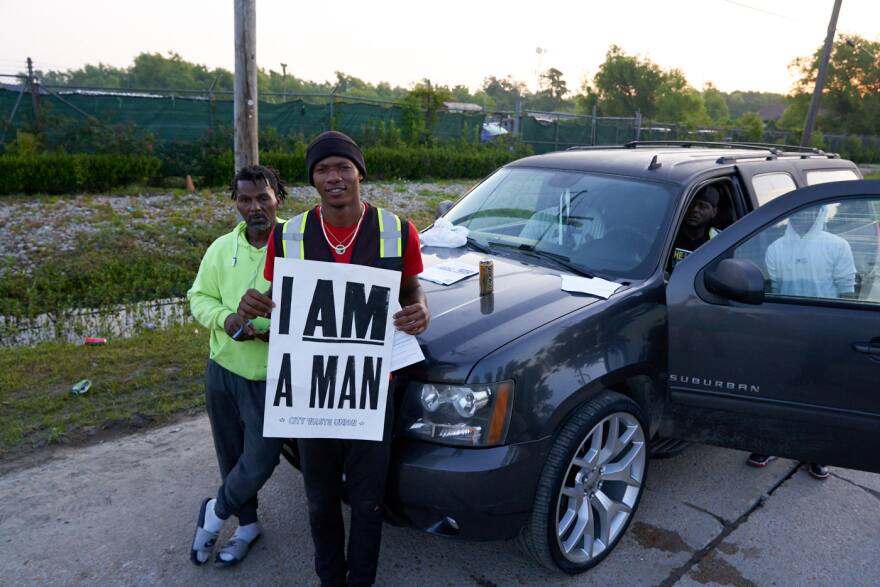D’Artanian DeJean is a hopper — the one who jumps off the garbage truck to grab your bin and empty it. It’s not an easy job in the best of times, he said. Heavy loads, low pay, risks of injury without benefits, the kind of job where you hope to work overtime just to earn $400 a week to cover your bills.
And DeJean said longtime job complaints have come to a head under the coronavirus pandemic. He’s among the sanitation workers in New Orleans entering their second week of a strike launched to demand better working conditions: daily personal protective equipment like gloves and masks; fixing the broken trucks that leak hydraulic fluid on workers; raising wages from $10 to $15 per hour; and providing weekly hazard pay of $150.
“COVID has had a very major impact,” he said. “We have not been treated like frontline workers. If you consider your police officers and your nurses and doctors to be on the front line, then we are definitely in that same group because we have not been asked to stop working.
“You think I'm going to be given an opportunity to work if I'm complaining about COVID? No way. I'll be sent home, because the major concern is getting the work done.”

Sanitation workers aren’t given anything to cover their eyes, ears, nose or mouth, he said. “They'll give us gloves, and that's first come first serve. So once they run out that's it, you better find some old gloves or no gloves. The only thing they make sure you have before you go out is a vest”
That vest is intended to protect workers from getting hit by vehicles, but DeJean said that still happens.
Soon after the strike’s start, workers said they were told they’d been replaced and fired by Gina Hurd, the local manager for PeopleReady. The company employs sanitation workers as part of a contract to fill jobs for Metro Services Group, which in turn has a contract to collect garbage with the city of New Orleans.
Prisoners on work release were reportedly filling their jobs for the reduced rate of $9.25 an hour, a fraction of which prisoners get to keep.

But on Tuesday, striking workers were handed a letter stating that they had not been fired, and could “return to work at the Metro Services account.”
“I am writing you this letter so that there is no misunderstanding about your employment status with PeopleReady,” the letter, signed by Hurd, reads. “Going on strike (and remaining on strike) is your legal right. PeopleReady absolutely respects that right.”
New Orleans Public Radio’s calls to Metro Services Group and PeopleReady were not returned. A representative from Lock5 LLC, which manages the work release program, told NOLA.com that the company was unaware of the strike when it agreed to send prisoners to work for Metro and has since pulled those prisoners out of the jobs.
In a statement on Friday, a spokesperson from the office of Mayor LaToya Cantrell said Metro was paid $10.7 million in 2019 to collect garbage and recycling. “Metro is responsible for providing workers with the necessary items for their safety, including masks, gloves, etc,” the statement said.

DeJean said he’s afraid of catching a virus that has already hit his family and others he knows. “I’ve a couple family members that have been sick, quite recently coming into recovery. A friend of mine’s female friend actually passed away.”
Striking workers aren’t going to go back to their jobs without a change, he said. “We see no reason to stop our protests until our demands are actually met. You're a multi-million dollar company that can definitely provide for any human being that is chosen to sign a contract for you guys. So we know it's in your ability.”
“We’re trying to work with them. We do want to go back to work,” he added, but “we'd like to be treated properly. We're not asking for much.”
Update, 5:30 p.m.: In a statement, Metro said striking workers' complaints were "wholly inaccurate and intentionally misleading." It said it purchased 15,000 N95 masks prior to the strike and made face coverings, gloves and hand sanitizers available to workers, equipment that Metro ensured all workers were using prior to their shifts. Metro also said it has "routinely" sanitized vehicles and equipment, and that PeopleReady also has a "very strict COVID-19 health and safety protocol." The company called it's $10 per hour salary "a decent living wage set forth by our client, the City, in the Ordinance adopted by the New Orleans City Council in 2016."



